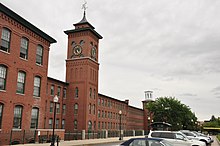
The Nashua Manufacturing Company was a cotton textile manufacturer in Nashua, New Hampshire, that operated from 1823 to 1945. It was one of several textile companies that helped create what became the city of Nashua, creating roads, churches and its own bank as part of the process. Like most New England textile mills it struggled during the Depression. It shut in 1947, when much of the industry had moved South for cheaper labor and land. [1]
History


Nashua was one of several towns that was established along the Merrimack River to take advantage of water power in the early days of the Industrial Revolution. [2] The most notable mills were the Merrimack mills (founded 1823) in Lowell, Massachusetts, [3] and the Amoskeag mills (founded 1810) at Manchester, New Hampshire, [4] where the Millyard Museum is located. [5]
The Nashua Manufacturing Company was incorporated in 1823 on the initiative of Daniel Abbot. [6] [7] Abbot is considered the "father of Nashua", and he was part of the town when it was renamed from Dunstable, New Hampshire, to Nashua in 1837. [7] [8] He and other citizens began the company after buying up land from the banks of the Merrimack along the Nashua River up to Mine Falls, as they planned to use the falls to power their mills. [9] They hired Asher Benjamin to design the mills, including churches and a grid of streets. [10] [11] The company helped fund the digging of the Nashua power canal. [12] After the canal was complete, the company built more mill buildings and hired more labor, likely helping the town's population rise from 1,142 to 2,417 in the years 1820-1830. [9] [11] [13]
In 1835, one of the founders of the company also founded the Nashua Bank, later known as the Indian Head Bank, which used its own currency. [14] The Nashua Manufacturing Company was larger than other mills built during this time and during the 19th and early 20th centuries, bought several other textile manufacturers, including Jackson Company, Indian Head Mills, and Tremont and Suffolk Mills. [15] The company owned the largest contiguous portion of these properties encompassing 400 acres and is now protected as Mine Falls Park and the Nashua Manufacturing Company Historic District. [16] [17]
It was acquired by Textron Inc. in 1945. In 1947, Textron liquidated the mill, throwing some 2,000 people out of work when the city had a population of about 25,000. [18] [19] [20]
Six of the mill buildings along the Nashua River were converted into apartments in the early 2000s and are now known as Clocktower Place Apartments. [21] [22]
References
- ^ "The Causes of Deindustrialization: The Migration of the Cotton Textile Industry from New England to the South"
- ^ "A brief history of the Merrimack". New Hampshire Magazine. 2010-04-01. Retrieved 2021-06-24.
- ^ "A chance to protect living, flowing history". Lowell Sun. 2006-10-25. Retrieved 2021-06-24.
- ^ Lalli, James (2020-11-12). "Check out these historic sites in the Merrimack Valley". WMUR. Retrieved 2021-06-24.
- ^ "A new museum will weave story of Manchester's past". Newspapers.com. 11 March 2001. Retrieved 2021-06-24.
- ^ "History of the Nashua Manufacturing Co". Newspapers.com. 17 August 1916. Retrieved 2021-06-24.
- ^ a b "History of Nashua is Program Topic". Newspapers.com. 24 October 1975. Retrieved 2021-06-24.
- ^ "Around the Town". Newspapers.com. 9 March 1951. Retrieved 2021-06-24.
- ^ a b Webster, Kimball (1913). History of Hudson, N.H.: Formerly a Part of Dunstable, Mass., 1673-1733, Nottingham, Mass., 1733-1741, District of Nottingham, 1741-1746, Nottingham West, N.H., 1746-1830, Hudson, N.H., 1830-1912. Granite State Publishing Company. pp. 402–04.
- ^ "Around the Town". Newspapers.com. 25 May 1960. Retrieved 2021-06-25.
- ^ a b History of Nashua website
- ^ "Textile Mills Aided City's Development". Newspapers.com. 29 June 1971. Retrieved 2021-06-25.
- ^ "The Old Nashua Manufacturing Co Started Its Mills Here in 1825". Newspapers.com. 30 June 1962. Retrieved 2021-06-25.
- ^ "Indian Head Bank, Nashua, Marks 125th Anniversary". Newspapers.com. 31 January 1976. Retrieved 2021-06-25.
- ^ Coolidge, Austin Jacobs; Mansfield, John Brainard (1859). A History and Description of New England, General and Local: Maine, New Hampshire, and Vermont. A.J. Coolidge.
- ^ "Mine Falls Park advisory committee offers historic Gatehouse tour". nashuatelegraph.com. Retrieved 2021-06-25.
- ^ "National Register of Historic Places Inventory - Nomination Form: Nashua Manufacturing Company Historic District".
- ^ Nashuanh.gov: History of Nashua
- ^ "Textile Mills Aided City's Development". Newspapers.com. 29 June 1971. Retrieved 2021-06-25.
- ^ "The Little Plan... for Nashua Mfg. Co". Newspapers.com. 29 July 1947. Retrieved 2021-06-25.
- ^ "Nashua Looks Inward". Newspapers.com. 15 February 2007. Retrieved 2021-06-25.
- ^ "Nashua, looking inward, OK's downtown residences". Newspapers.com. 15 February 2007. Retrieved 2021-06-25.
External links
Archives and records
- Nashua Manufacturing Company records at Baker Library Special Collections, Harvard Business School.
- Companies based in Nashua, New Hampshire
- History of New Hampshire
- Manufacturing companies established in 1823
- Textile mills in the United States
- Defunct manufacturing companies based in New Hampshire
- Manufacturing companies disestablished in 1945
- American companies established in 1823
- 1823 establishments in New Hampshire
- 1945 disestablishments in New Hampshire
- 1945 mergers and acquisitions